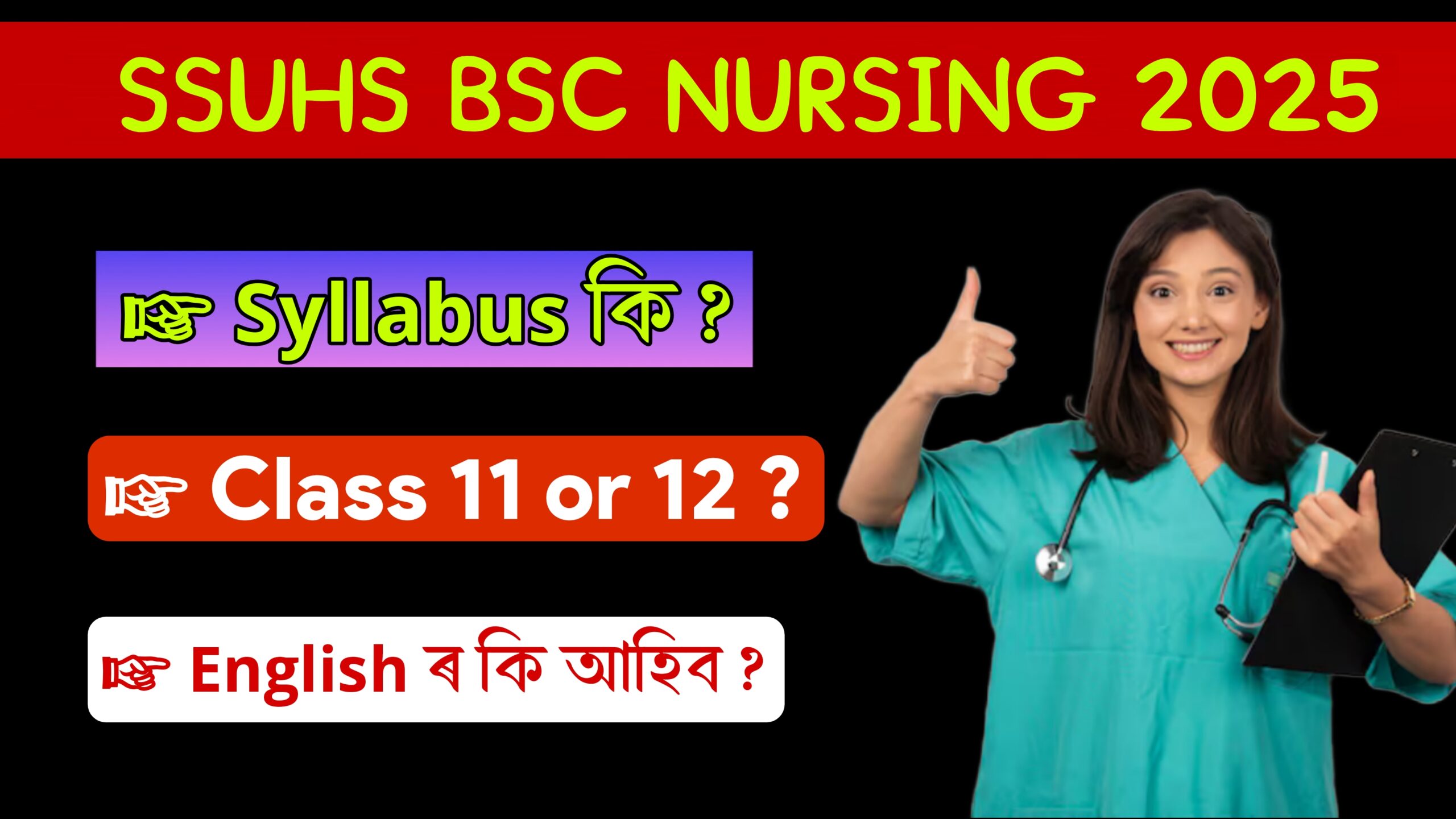The Srimanta Sankaradeva University of Health Sciences (SSUHS) BSc Nursing Entrance Exam 2025 is a highly competitive examination for students aspiring to pursue a career in nursing. To excel in this entrance test, a thorough understanding of the syllabus is essential. The SSUHS BSc Nursing Entrance Exam syllabus 2025 is based on the Class 11 and 12 curriculum of Physics, Chemistry, Biology, and English Grammar, as prescribed by the Assam Higher Secondary Education Council (AHSEC). Each subject carries 25 marks, making the total exam worth 100 marks. This comprehensive guide provides an in-depth overview of the syllabus, including key topics, marking scheme, and preparation tips to help candidates succeed.
📌 SSUHS BSc Nursing Entrance Exam 2025: Key Details
| Category | Details |
|---|---|
| Exam Name | SSUHS BSc Nursing Entrance Exam 2025 |
| Conducting Authority | Srimanta Sankaradeva University of Health Sciences (SSUHS) |
| Exam Date | 22 June 2025 |
| Application Start Date | 23 April 2025 |
| Last Date to Apply | 22 May 2025 |
| Admit Card Release | 02 June 2025 (Download Online) |
| Exam Mode | Offline (OMR Sheet-Based) |
| Exam Duration | 2 Hours |
| Helpline Numbers | 7977259728 / 8108014947 ( SSUHS ) |
| Study Material | Download Now |
| Mock Test Series | Download Now |
Overview of SSUHS BSc Nursing Entrance Exam Syllabus 2025
The SSUHS BSc Nursing Entrance Exam is designed to assess candidates’ knowledge in core science subjects and English proficiency, which are critical for a career in nursing. The syllabus aligns with the AHSEC Class 11 and 12 curricula, ensuring that students who have studied these subjects in their higher secondary education are well-prepared. Below is a breakdown of the syllabus for each subject, along with the official AHSEC syllabus documents for reference.
Exam Pattern
- Total Marks: 100
- Subjects: Physics, Chemistry, Biology, English Grammar
- Marks per Subject: 25 marks
- Question Type: Multiple Choice Questions (MCQs)
- Duration: Typically 2 hours (subject to official confirmation)
- Medium : Assamese & English
- Negative Mark : No
Detailed Syllabus for SSUHS BSc Nursing Entrance Exam 2025
🚀 Supercharge Your Exam Preparation! �
Get Instant Access to Premium Study Materials
Instant Download & Study Anytime
No waiting time – start learning immediately!
📚 BSc Nursing | Pharmacy | Paramedical | 📚
🔥📥 Get the latest edition now! 📥🔥
🎁 Exclusive Limited Offer: Use code STUDY – Only for the first 50 students!
📖 GNM Nursing Entrance Ebooks ✅
Need help? Watch our step-by-step download guide
If you have any questions, feel free to contact us. We’re happy to assist you!
Thank you for your interest! Take your time, and feel free to reach out whenever you’re ready.
The syllabus is derived from the AHSEC Class 11 and 12 curricula for Physics, Chemistry, Biology, and English Grammar. Below, we outline the key topics for each subject based on the official AHSEC syllabus documents. Candidates are encouraged to refer to these documents for a complete understanding of the topics.
1. Physics (25 Marks)
The Physics syllabus covers fundamental concepts from Class 11 and 12, focusing on both theoretical and practical applications. The topics are designed to test candidates’ understanding of physical principles relevant to medical and nursing sciences.
Class 11 Physics Syllabus
- Physical World and Measurement: Units, dimensions, errors in measurement
- Kinematics: Motion in a straight line, motion in a plane, projectile motion
- Laws of Motion: Newton’s laws, friction, circular motion
- Work, Energy, and Power: Work-energy theorem, kinetic and potential energy, conservation of energy
- Motion of System of Particles and Rigid Body: Centre of mass, rotational motion, moment of inertia
- Gravitation: Universal law of gravitation, Kepler’s laws, gravitational potential
- Properties of Bulk Matter: Elasticity, viscosity, surface tension, heat, and thermodynamics
- Thermodynamics: Laws of thermodynamics, heat transfer, thermal expansion
- Behaviour of Perfect Gas and Kinetic Theory: Ideal gas laws, kinetic theory of gases
- Oscillations and Waves: Simple harmonic motion, wave motion, Doppler effect
Reference: AHSEC Class 11 Physics Syllabus
Class 12 Physics Syllabus
- Electrostatics: Electric charges, Coulomb’s law, electric field, Gauss’s law, capacitors
- Current Electricity: Ohm’s law, Kirchhoff’s laws, electrical circuits, heating effects
- Magnetic Effects of Current and Magnetism: Biot-Savart law, Ampere’s law, magnetic materials
- Electromagnetic Induction and Alternating Currents: Faraday’s law, Lenz’s law, AC circuits
- Electromagnetic Waves: Properties, electromagnetic spectrum
- Optics: Reflection, refraction, lenses, optical instruments, wave optics, interference, diffraction
- Dual Nature of Matter and Radiation: Photoelectric effect, de Broglie waves
- Atoms and Nuclei: Atomic structure, radioactivity, nuclear reactions
- Electronic Devices: Semiconductors, diodes, transistors
- Communication Systems: Basics of communication, modulation, satellite communication
Reference: AHSEC Class 12 Physics Syllabus
2. Chemistry (25 Marks)
The Chemistry syllabus includes topics from physical, inorganic, and organic chemistry, emphasizing concepts relevant to biological and medical sciences.
Class 11 Chemistry Syllabus
- Some Basic Concepts of Chemistry: Mole concept, stoichiometry, atomic structure
- Structure of Atom: Bohr’s model, quantum numbers, electronic configuration
- Classification of Elements and Periodicity in Properties: Periodic table, periodic trends
- Chemical Bonding and Molecular Structure: Ionic and covalent bonds, VSEPR theory, hybridization
- States of Matter: Gases, liquids, intermolecular forces
- Thermodynamics: Enthalpy, entropy, Gibbs free energy
- Equilibrium: Chemical and ionic equilibrium, acids and bases
- Redox Reactions: Oxidation-reduction, balancing equations
- Hydrogen: Properties, hydrides
- s-Block Elements: Alkali and alkaline earth metals
- p-Block Elements: Group 13 and 14 elements
- Organic Chemistry – Some Basic Principles: Nomenclature, isomerism, reaction mechanisms
- Hydrocarbons: Alkanes, alkenes, alkynes, aromatic hydrocarbons
- Environmental Chemistry: Pollution, greenhouse effect
Reference: AHSEC Class 11 Chemistry Syllabus
Class 12 Chemistry Syllabus
- Solid State: Crystal structures, defects
- Solutions: Concentration, colligative properties
- Electrochemistry: Conductance, electrochemical cells, Nernst equation
- Chemical Kinetics: Rate laws, Arrhenius equation
- Surface Chemistry: Adsorption, catalysis, colloids
- General Principles and Processes of Isolation of Elements: Metallurgy
- p-Block Elements: Group 15 to 18 elements
- d and f Block Elements: Transition metals, lanthanides
- Coordination Compounds: Nomenclature, isomerism, bonding
- Haloalkanes and Haloarenes: Reactions, mechanisms
- Alcohols, Phenols, and Ethers: Preparation, properties
- Aldehydes, Ketones, and Carboxylic Acids: Reactions, acidity
- Amines: Preparation, basicity
- Biomolecules: Carbohydrates, proteins, nucleic acids
- Polymers: Types, polymerization
- Chemistry in Everyday Life: Drugs, detergents
Reference: AHSEC Class 12 Chemistry Syllabus
3. Biology (25 Marks)
The Biology syllabus is divided into Botany and Zoology, covering essential topics for nursing aspirants, such as human physiology and genetics.
Class 11 Biology Syllabus
- Diversity in Living World: Classification, taxonomy, five kingdom system
- Structural Organisation in Animals and Plants: Tissues, morphology, anatomy
- Cell Structure and Function: Cell theory, cell organelles, cell division
- Plant Physiology: Photosynthesis, respiration, plant growth, mineral nutrition
- Human Physiology: Digestion, respiration, circulation, excretion, locomotion, neural control
Reference: AHSEC Class 11 Biology Syllabus
Class 12 Biology Syllabus
- Reproduction: Human reproduction, reproductive health
- Genetics and Evolution: Mendelian genetics, molecular basis of inheritance, evolution
- Biology and Human Welfare: Health, diseases, immunity, microbes in human welfare
- Biotechnology and Its Applications: Principles, applications in health and agriculture
- Ecology and Environment: Ecosystems, biodiversity, environmental issues
Reference: AHSEC Class 12 Biology Syllabus
4. English Grammar
A. Tenses
- Present Simple
- Present Continuous
- Present Perfect
- Present Perfect Continuous
- Past Simple
- Past Continuous
- Past Perfect
- Past Perfect Continuous
- Future Simple
- Future Continuous
- Future Perfect
- Future Perfect Continuous
B. Parts of Speech
- Nouns
- Pronouns
- Verbs
- Adjectives
- Adverbs
- Prepositions
- Conjunctions
- Interjections
C. Subject-Verb Agreement Rules
- Singular subject + singular verb
- Plural subject + plural verb
- Collective nouns (team, family) = usually singular
- “Either/or” & “Neither/nor” = verb agrees with nearest subject
D. Common Error Types
- Misplaced modifiers
- Double negatives
- Wrong tense sequence
- Incorrect preposition usage
- Subject-verb disagreement
- Pronoun-antecedent mismatch
E. Prepositions
- Time: at, on, in
- Place: in, at, on
- Direction: to, into, toward
- Phrasal verbs: look after, put off
F. Voice & Narration
- Active to Passive conversion
- Direct to Indirect speech (tense shift, pronoun change)
G. Sentence Structures
- Simple, Compound, Complex sentences
- Conditional sentences (Zero, First, Second, Third)
H. Vocabulary
- Synonyms/Antonyms
- One-word substitutions
- Idioms & Phrases
- Homonyms/Homophones
I. Spotting Errors
- Redundancy (e.g., “return back”)
- Incorrect word forms (e.g., “advice” vs. “advise”)
- Wrong comparisons (e.g., “older than me” vs. “older than I”)
AHSEC Class 11 Syllabus Links
| Subject | Syllabus PDF Link |
|---|---|
| Physics | Click Here |
| Chemistry | Click Here |
| Biology | Click Here |
AHSEC Class 12 Syllabus Links
| Subject | Syllabus PDF Link |
|---|---|
| Physics | Click Here |
| Chemistry | Click Here |
| Biology | Click Here |
Preparation Tips for SSUHS BSc Nursing Entrance Exam 2025
To score well in the SSUHS BSc Nursing Entrance Exam, candidates should follow a strategic preparation plan. Here are some effective tips:
- Understand the Syllabus: Download and thoroughly review the AHSEC Class 11 and 12 syllabi for Physics, Chemistry, Biology, and English. Use the official links provided above.
- Create a Study Schedule: Allocate equal time to each subject, focusing on high-weightage topics. Dedicate time to revising weak areas.
- Practice Previous Year Papers: Solve AHSEC previous year question papers and sample papers to understand the exam pattern and question types. These are available on the AHSEC website (ahsec.assam.gov.in).
- Focus on NCERT Textbooks: The AHSEC syllabus is closely aligned with NCERT textbooks for Class 11 and 12. Study these books thoroughly for Physics, Chemistry, and Biology.
- Improve English Skills: Practice grammar exercises, read comprehension passages, and write essays to enhance language proficiency.
- : Simulate exam conditions by taking timed mock tests to improve speed and accuracy.
- : Regularly check the SSUHS official website (www.ssuhs.in) for notifications regarding exam dates, application forms, and admit cards.
- Focus on MCQ-based practice for Physics, Chemistry, and Biology.
| # | Links |
|---|---|
| ✅ Our Website | Click Here |
| ✅ eBooks & Mock Tests | Click Here |
| ✅ Subscribe us | Click Here |
| ✅ Follow us on Instagram | Click Here |


